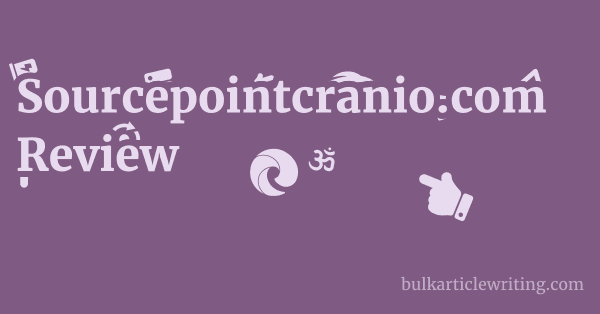When evaluating a service like Sourcepointcranio.com, it’s vital to focus on its significant drawbacks, particularly from an ethical and scientific standpoint.
Read more about sourcepointcranio.com:
Sourcepointcranio.com Review & First Look: Unpacking the Claims
Sourcepointcranio.com Features: Examining the Modalities and Claims
The claims made by the website present several major concerns that should give any potential client pause, especially those seeking permissible and effective solutions for their well-being.
Reliance on Unscientific and Esoteric Claims
The most glaring con is the heavy reliance on unproven, esoteric concepts.
Phrases like “transmutation of foreign energies,” “chakra balancing,” and addressing “past life trauma” are central to the services offered.
|
0.0 out of 5 stars (based on 0 reviews)
There are no reviews yet. Be the first one to write one. |
Amazon.com:
Check Amazon for Sourcepointcranio.com Cons: Significant Latest Discussions & Reviews: |
These concepts are not supported by scientific consensus or evidence-based medicine.
They originate from various New Age and Eastern spiritual traditions that lack empirical verification.
- Lack of Empirical Support: There are no peer-reviewed, robust scientific studies demonstrating the efficacy of “transmuting entities” or “healing ancestral lines” through physical touch and “frequency.”
- Misleading Terminology: Using terms like “frequency” in a therapeutic context without a clear, scientifically defined mechanism can mislead individuals into believing there’s a technological or scientific basis to the claims.
- Risk of False Hope: Clients, often vulnerable and desperate for relief from chronic pain or deep-seated trauma, might invest significant time and money into therapies that offer false hope based on unsubstantiated claims, potentially delaying or preventing them from seeking legitimate, effective care.
- Data Point: A meta-analysis of alternative therapies for depression published in JAMA Psychiatry in 2016 often found little to no evidence for efficacy beyond placebo, especially for methods outside established psychotherapy or pharmacological interventions.
Conflict with Islamic Principles
For a Muslim audience, the ethical concerns are paramount. Sourcepointcranio.com Features: Examining the Modalities and Claims
The services offered by Sourcepointcranio.com directly conflict with several core Islamic principles:
- Shirk (Associating Partners with Allah): Believing that healing power resides in “chakras,” “frequencies,” “entities,” or “past lives,” rather than solely with Allah SWT, constitutes Shirk. Healing is from Allah, and while we are encouraged to seek permissible means (e.g., medicine, therapy), attributing inherent healing power to esoteric practices is problematic.
- Seeking Help from Other Than Allah: Relying on methods that do not align with Islamic teachings for spiritual or physical healing can be seen as seeking help from other than Allah or engaging in practices that could lead to superstition and deviation from pure monotheism.
- Data Point: The Quran repeatedly emphasizes Tawhid (Oneness of Allah), as in Surah Al-Fatiha (1:5): “You alone we worship, and You alone we ask for help.”
Lack of Professional Licensing and Regulation Transparency
The website does not prominently display information about Jemma’s specific professional licenses, certifications from accredited medical or psychological boards, or adherence to recognized regulatory bodies in the fields she purports to practice within (e.g., psychology, physical therapy, medicine).
- Unverified Qualifications: While “Jemma” is presented as a “practitioner,” the critical details regarding her formal education, medical or therapeutic degrees, and licensing status in any recognized jurisdiction are missing from the homepage. This is a significant red flag for any service claiming to address health issues.
- Consumer Protection Concerns: In many regions, practicing therapies that involve physical touch and profound psychological claims requires specific licensure to ensure practitioner competence and client safety. The absence of this information leaves consumers vulnerable and without clear recourse in case of adverse outcomes.
- Data Point: According to the Federation of State Boards of Physical Therapy (FSBPT), all U.S. states require physical therapists to be licensed, involving accredited education and passing a national exam. Similar licensing bodies exist for psychotherapists.
Vague and Unsubstantiated Promises
The language used on the website, while evocative, is also remarkably vague regarding the actual mechanisms of healing and the specific outcomes clients can expect, beyond anecdotal testimonials.
- Generic Benefits: Phrases like “unwind persistent and resistant physical and emotional issues,” “sleep better,” or “replace scarcity with trust” are broad. While these are desirable, how the unique “Sourcepointcranio” methodology specifically achieves them, beyond general relaxation from massage, is unclear.
- Emotional Manipulation: The “when are you ready to let go of the things that dim your light?” phrasing can be seen as emotionally manipulative, implying that the client is holding onto their suffering and that this particular therapy is the key to immediate liberation.
- Overpromising: The claims of “hormonal balancing,” “whole body structural alignment,” and freeing clients from “karmic tethers” are immense promises for which no scientifically recognized therapeutic modality can guarantee, especially through the described means.
- Data Point: A 2019 report by the Federal Trade Commission (FTC) on health fraud emphasizes that “miracle cures” and vague claims without scientific backing are common characteristics of fraudulent or misleading health products/services.
Pricing Structure Lacks Full Transparency and Standardization
While prices are listed, the varied pricing for “KITAS holders or expats” versus “regular” clients, and the mention of contacting for “affordable work or trade,” creates a less standardized and transparent pricing model than typically expected for professional services.
- Potential for Arbitrary Pricing: The ability to negotiate or request “affordable work or trade” can lead to inconsistent pricing for similar services, which might not always be fair or equitable.
- Incentivized Reviews: The explicit mention of “price incentives for friend, referrals, and honest reviews” can compromise the integrity of testimonials. While referrals are common, incentivizing “honest reviews” can subtly encourage positive bias, making it harder for potential clients to gauge genuine satisfaction levels.
- Data Point: The Consumer Federation of America (CFA) often advises consumers to be wary of businesses with inconsistent or non-transparent pricing, as this can be a red flag for unfair practices.
Sourcepointcranio.com Review & First Look: Unpacking the Claims

Leave a Reply